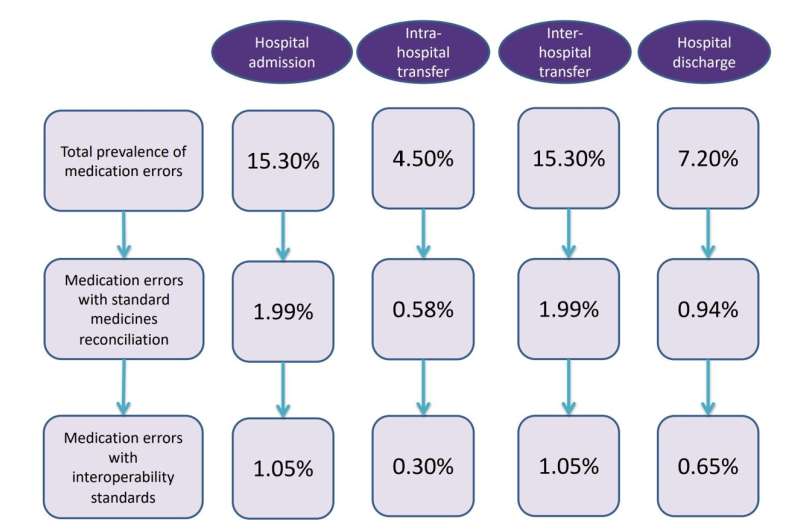This article has been reviewed according to Science X's editorial process and policies. Editors have highlighted the following attributes while ensuring the content's credibility:
fact-checked
trusted source
proofread
Electronic sharing of prescription medicines information would make patients safer, study shows

The number of medication errors occurring when people go into, or leave hospital, would reduce by 40% from 1.8 million to 1.1 million if information about medicines could be shared more easily electronically, University of Manchester health economists find.
Their study, commissioned by NHS England, also showed that the number of people affected by medication errors would reduce from around 370 thousand to around 220 thousand.
There would be about 12 thousand fewer people experiencing harm from their medicines, with 14 thousand fewer days spent in hospital saving around £6.6 million.
The results of the study come as the NHS introduces new digital information standards aiming to enable GP and hospital electronic records to communicate with each other.
The findings, published in a report on the University of Manchester website, mean that the standards are likely to help make health care safer for patients, argue the team.
Lead researcher Professor Rachel Elliott from The University of Manchester said, "When people are admitted to, or discharged from hospital, it is important that they, their families and people involved in their care, have the right information about their medicines."
"But sometimes medicines may be missed off the list, extra ones added, or wrong doses written down."
"These 'medication discrepancies' or 'transition medication errors' are so common worldwide in healthcare, the World Health Organization has made it a priority for health services to find ways to reduce them."
She added, "One effective way of avoiding this is when a health care professional, usually a pharmacist, creates a 'best possible medication history' by speaking to the patient, family, GP and looking at the patient's medical records. This can already find and prevent over 80% medication errors."
"If these records could share information electronically, it would be easier to find the correct information about a patient's medicines."
"This would reduce time spent finding out what medicines someone should be taking, and further reduce the number of errors."
By using data from published research and talking to experts, the research team identified how many transition medication errors happen every year in England and the avoidable harms to patients and costs to the NHS.
Using modeling, they then calculated how would the errors, avoidable harm and cost be affected by the new digital information standards.
More information: Report: pure.manchester.ac.uk/ws/porta … liott_et_al_2023.pdf




















